AWM137 2/2 - Historical information and general development of the RAAF Nursing Service - Letters and Histories for Press - Public Relations World War 2 - Part 5
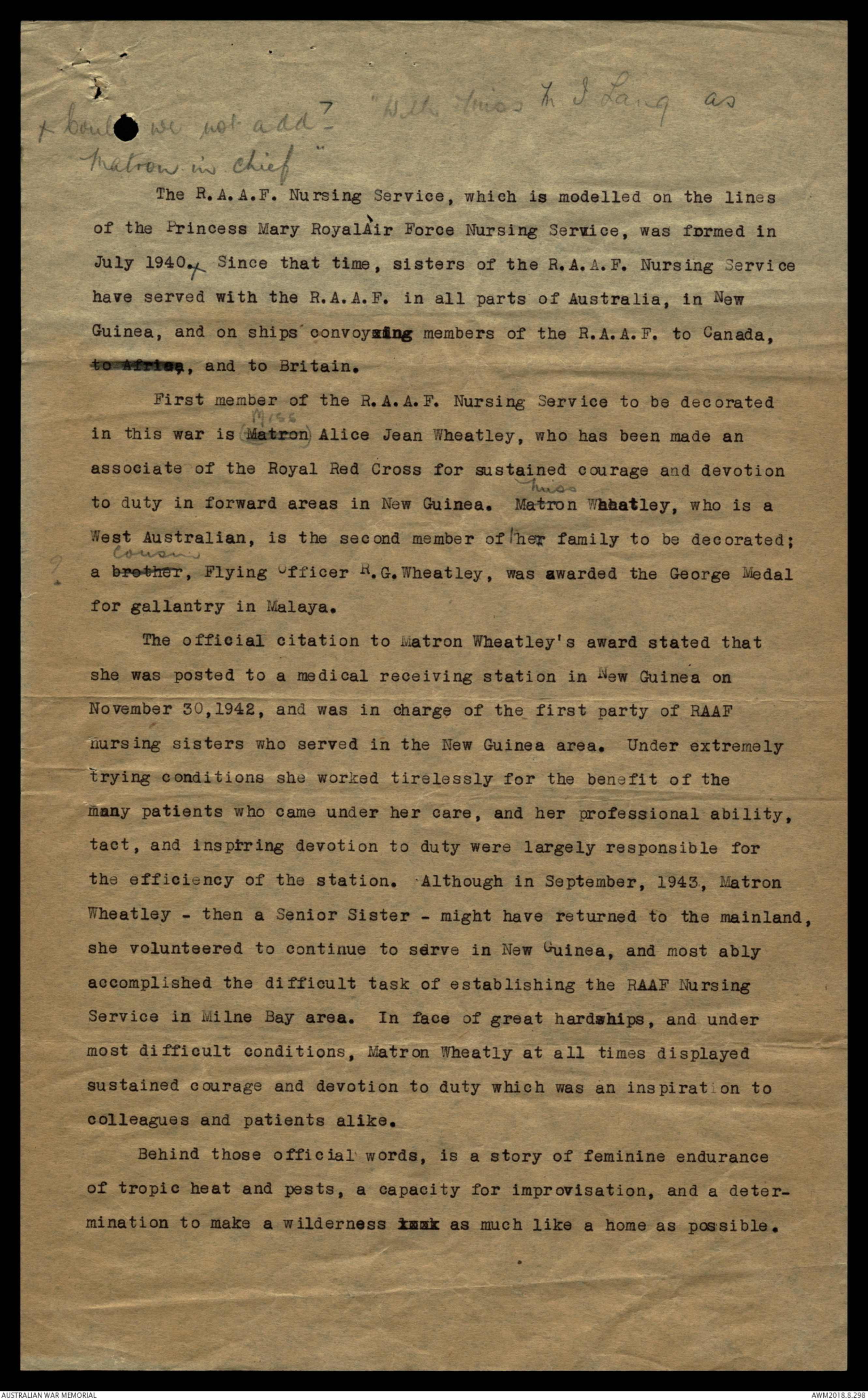
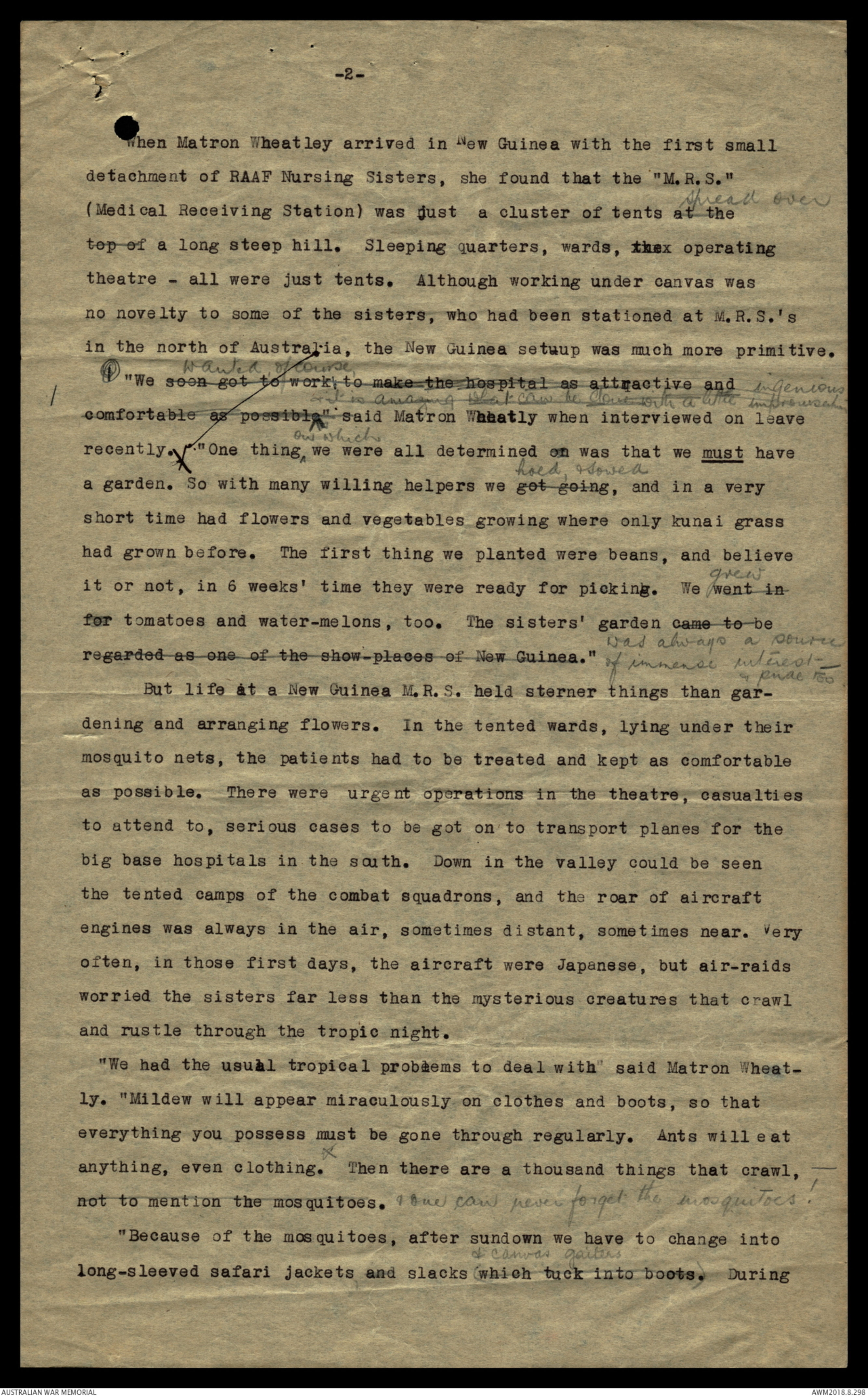
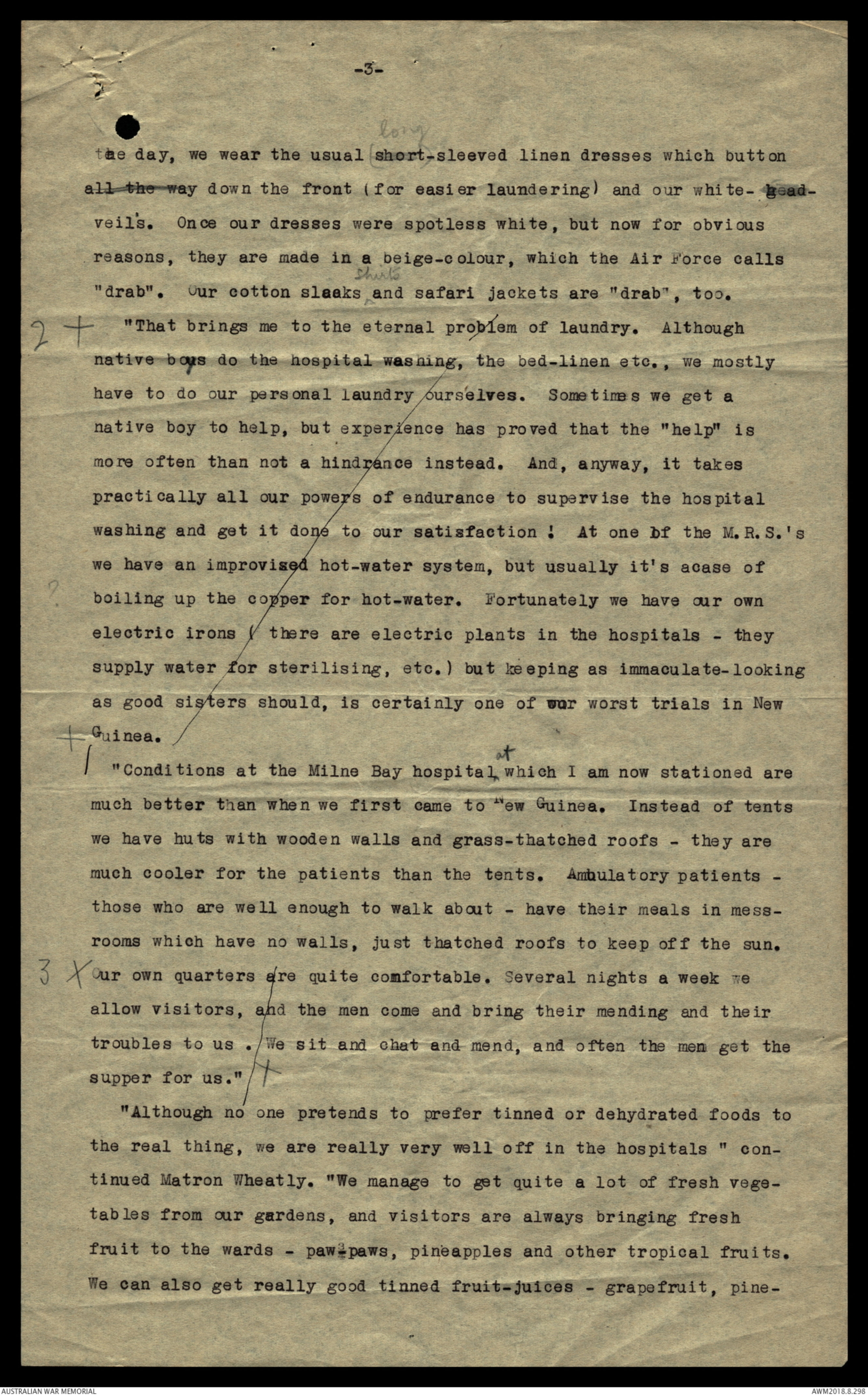
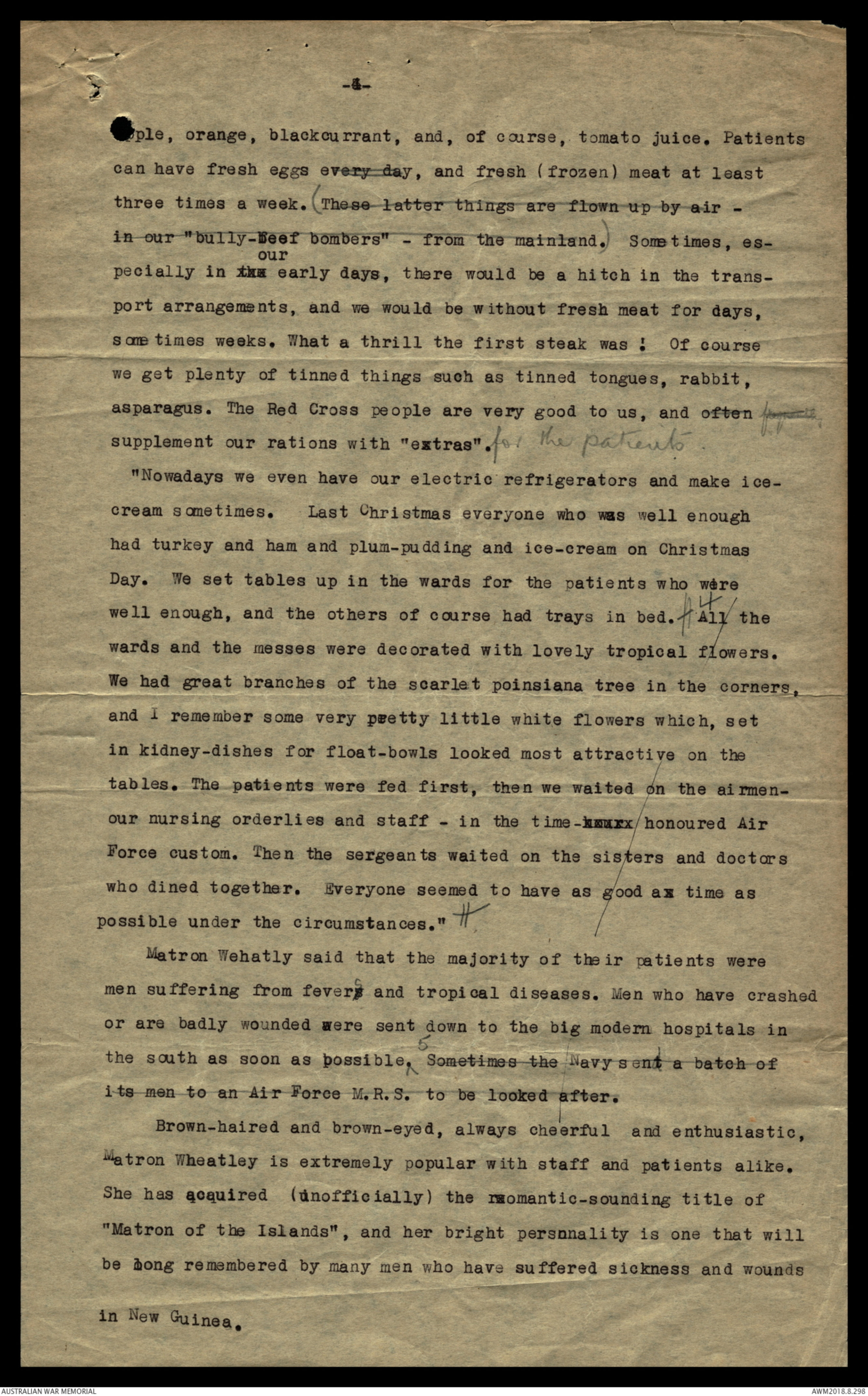
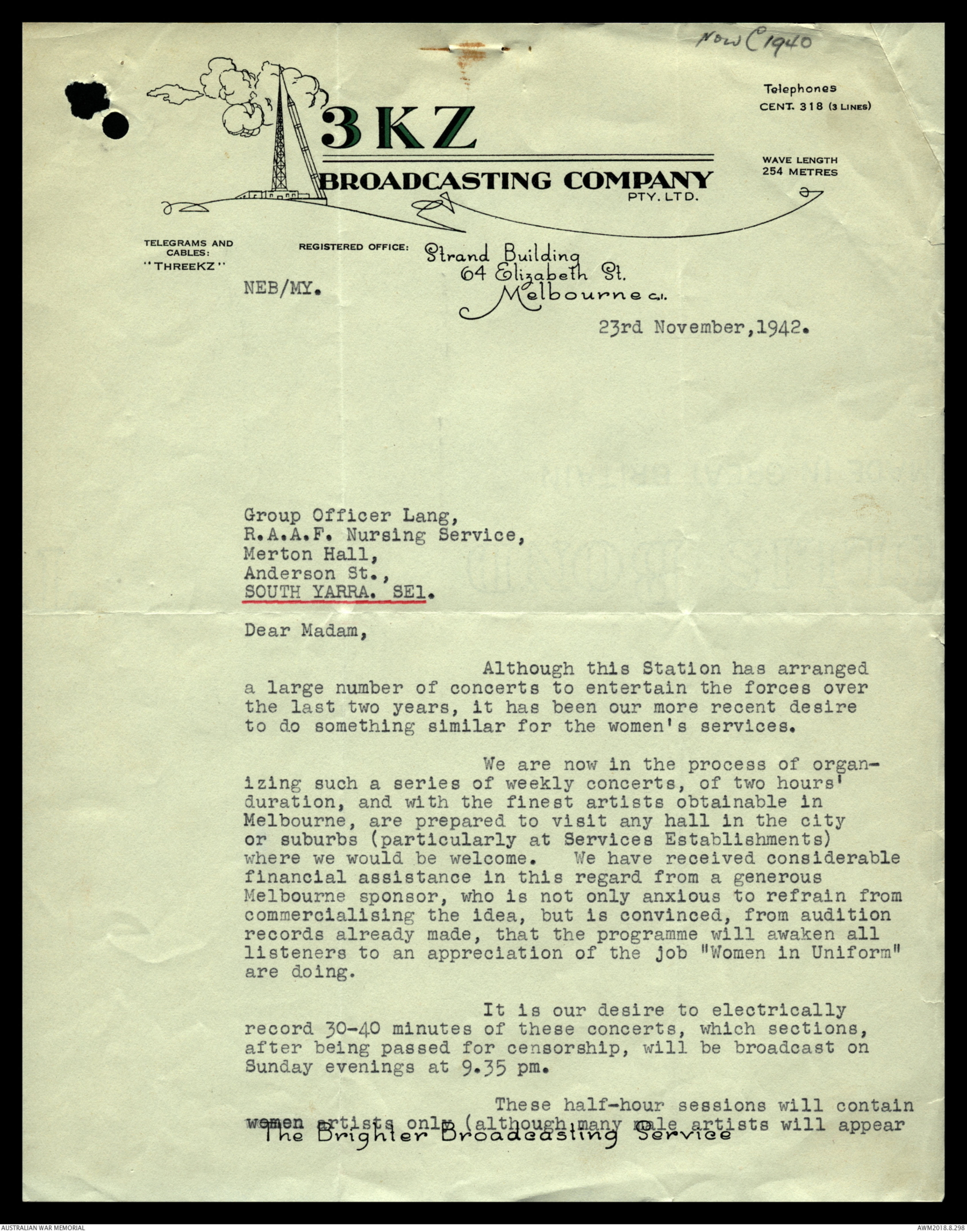
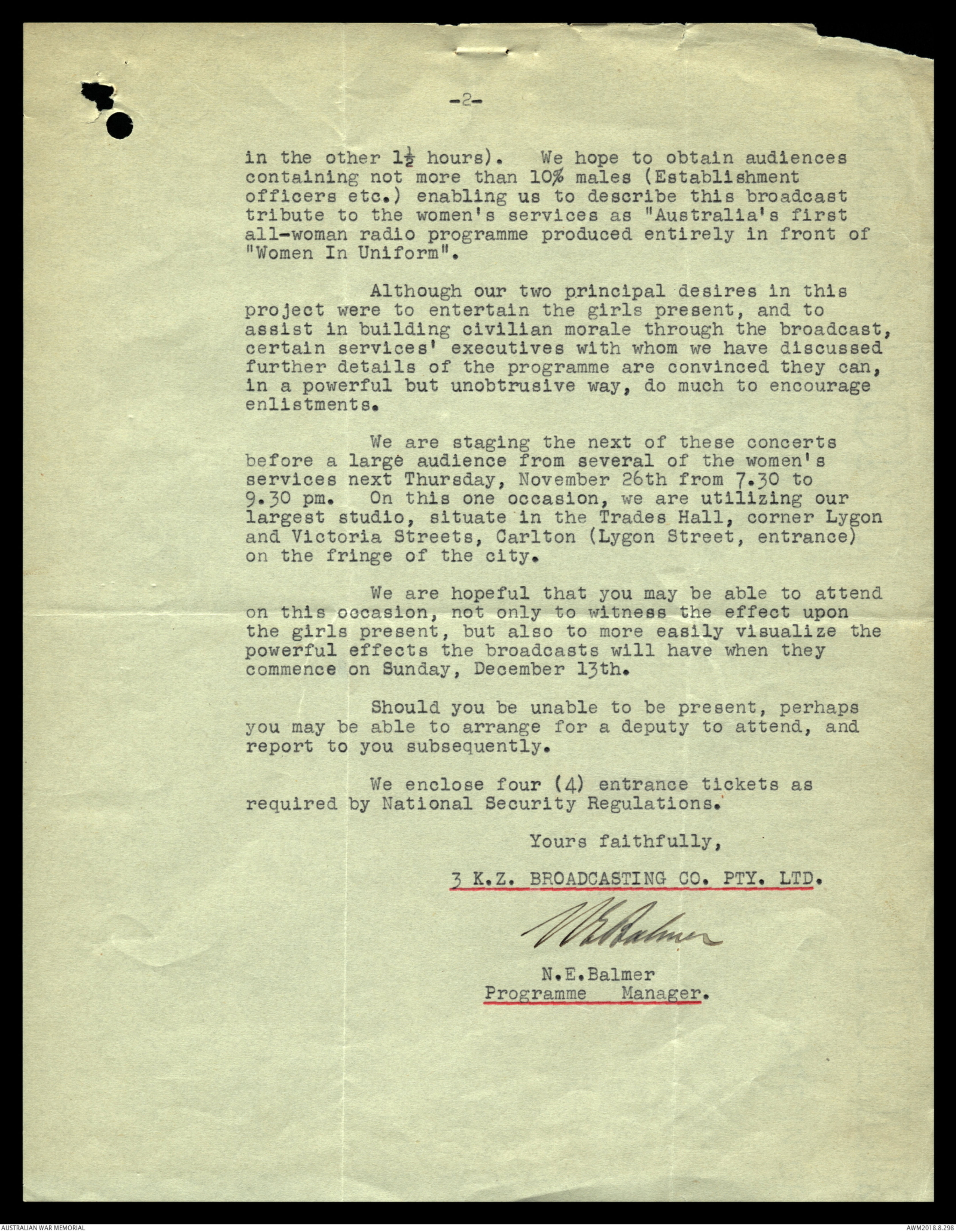
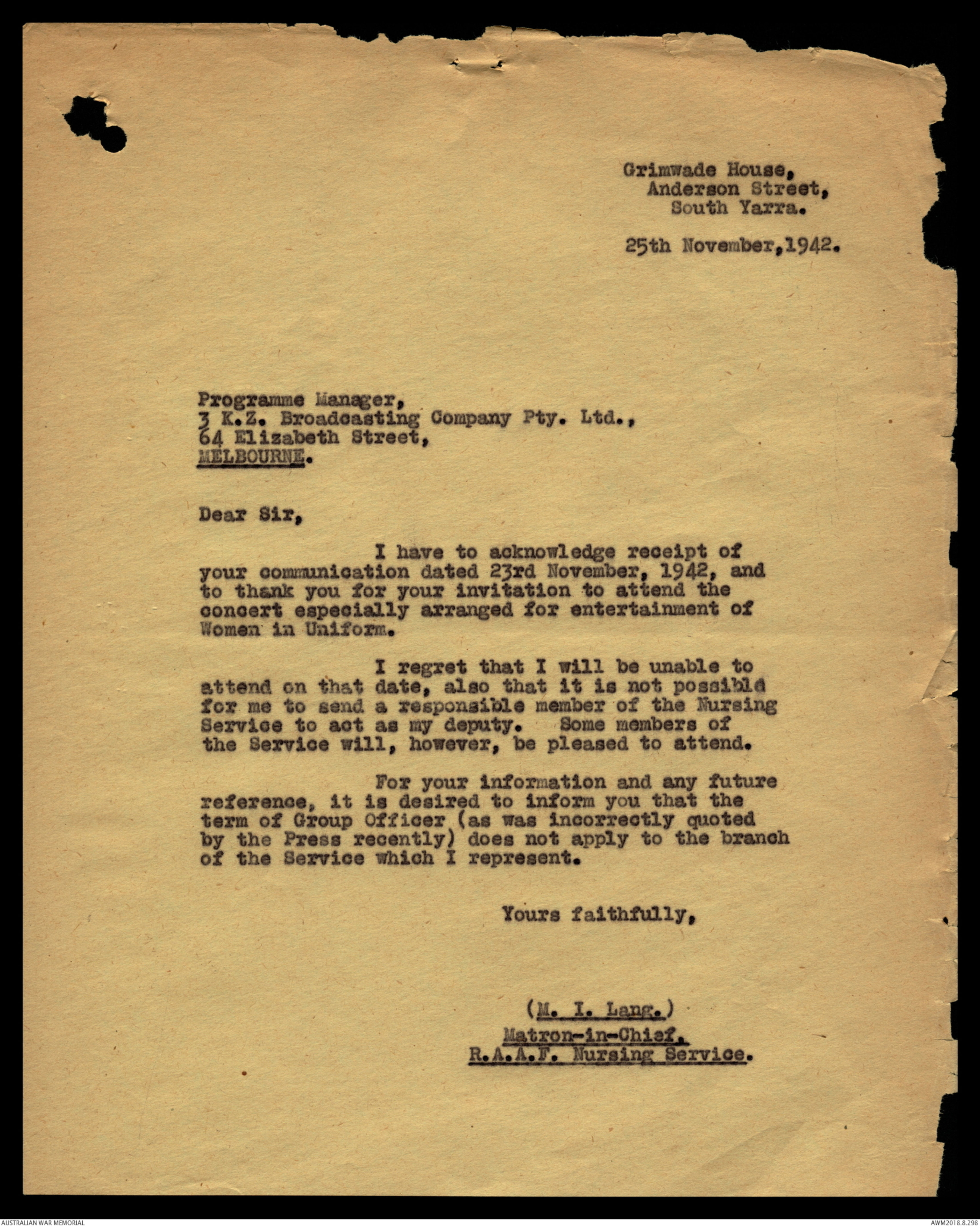
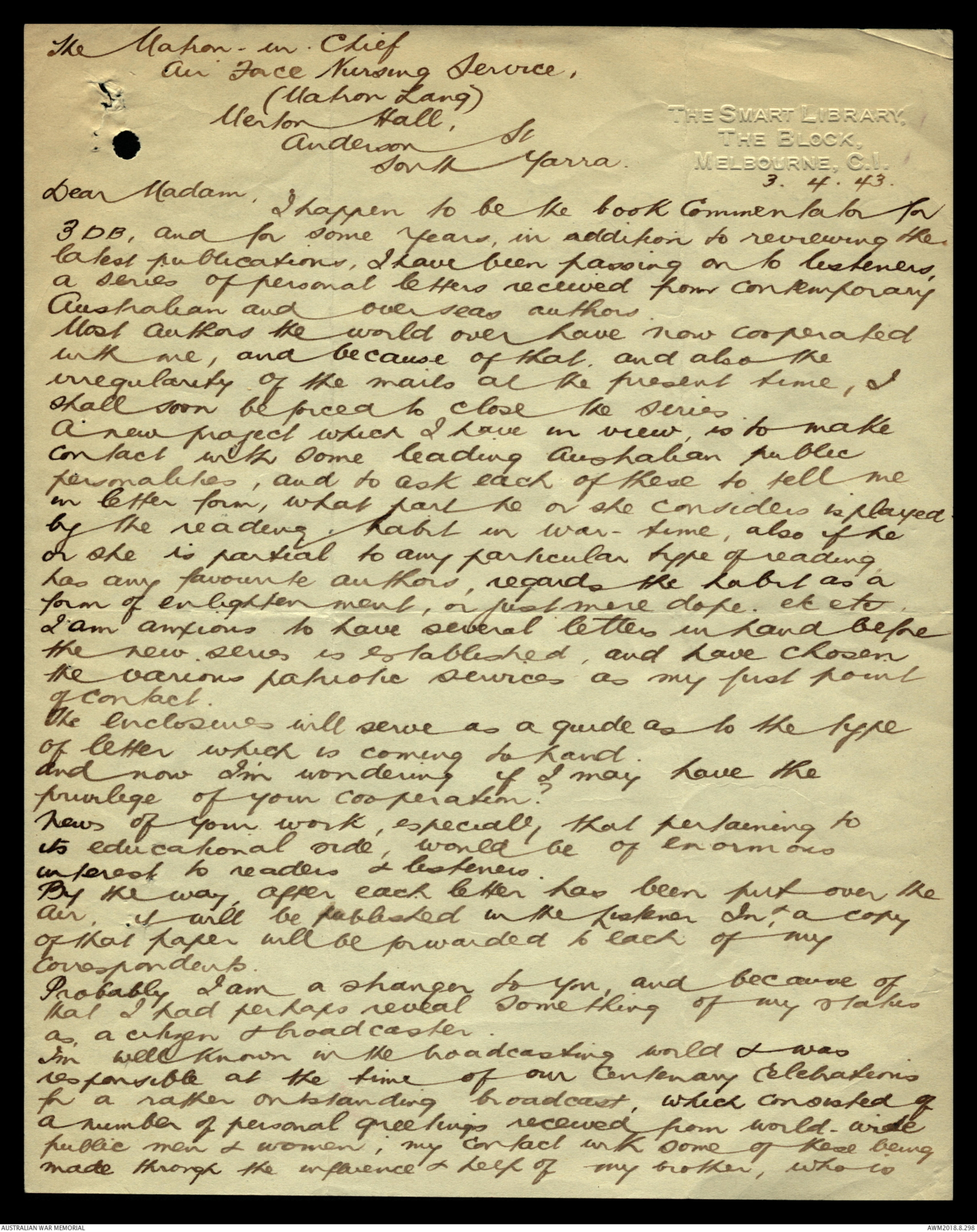
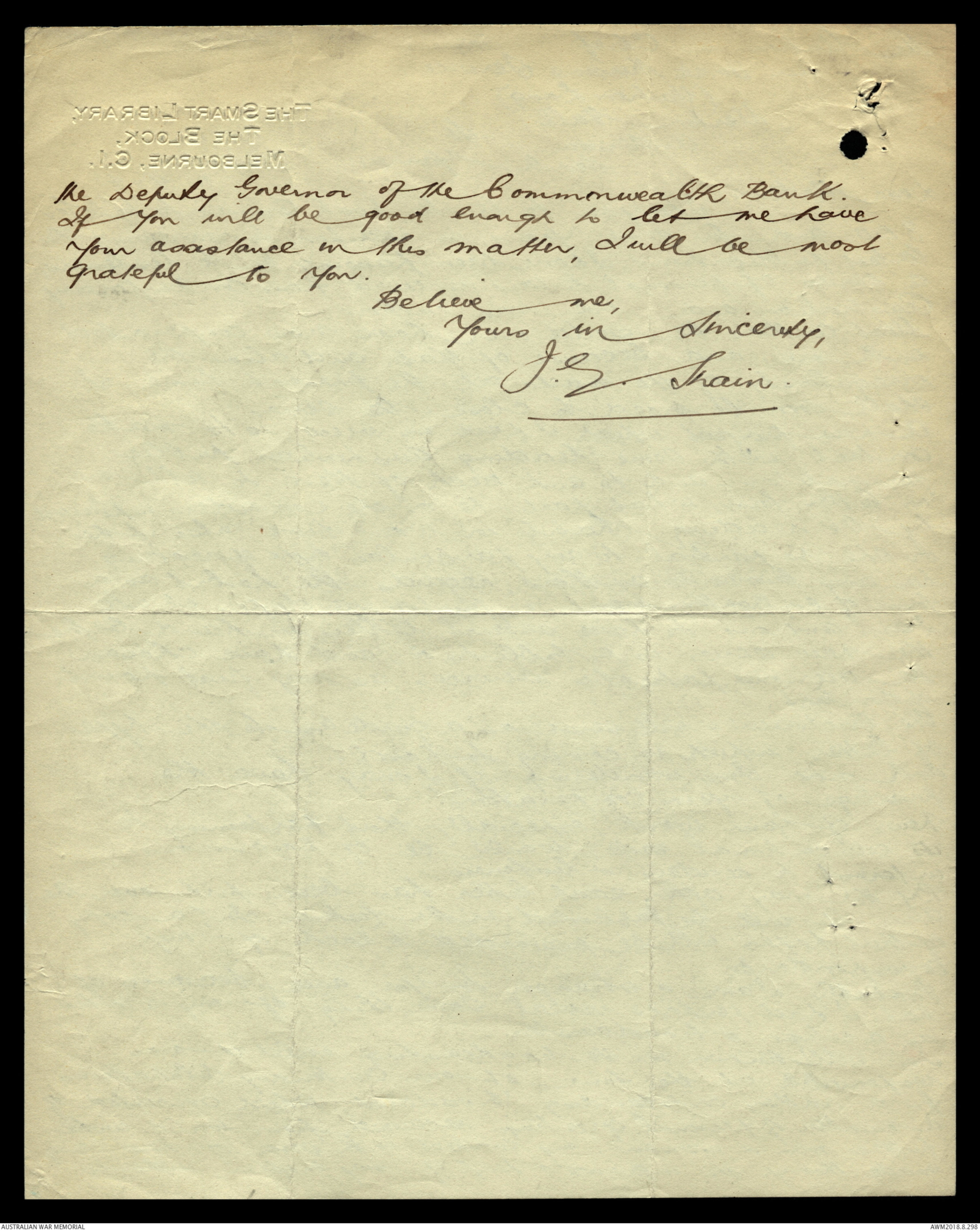
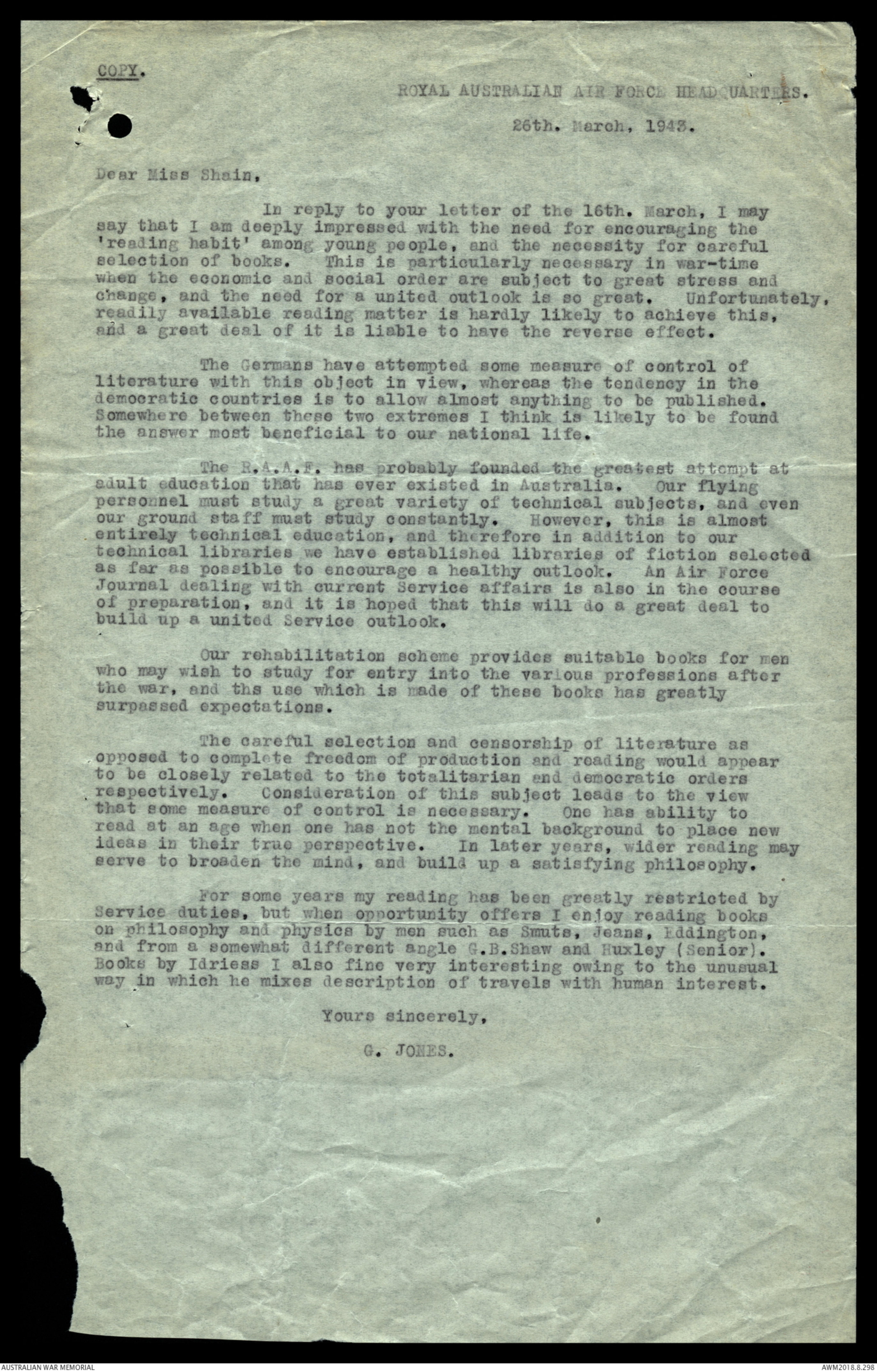
[* x Could we not add? "With Miss M I Lang as
Matron in Chief"*]
The R.A.A.F. Nursing Service, which is modelled on the lines
of the Princess Mary RoyalAir Force Nursing Service, was formed in
July 1940.x Since that time, sisters of the R.A.A.F. Nursing Service
have served with the R.A.A.F. in all parts of Australia, in New
Guinea, and on ships convoyxing members of the R.A.A.F. to Canada,to Africa, and to Britain.
First member of the R.A.A.F. Nursing Service to be decorated
in this war is (Matron) Miss Alice Jean Wheatley, who has been made an
associate of the Royal Red Cross for sustained courage and devotion
to duty in forward areas in New Guinea. Matron Miss Wheatley, who is a
West Australian, is the second member of her family to be decorated;
[*?*] a brother, cousin, Flying Officer R. G. Wheatley, was awarded the George Medal
for gallantry in Malaya.
The official citation to Matron Wheatley’s award stated that
she was posted to a medical receiving station in New Guinea on
November 30, 1942, and was in charge of the first party of RAAF
nursing sisters who served in the New Guinea area. Under extremely
trying conditions she worked tirelessly for the benefit of the
many patients who came under her care, and her professional ability,
tact, and inspiring devotion to duty were largely responsible for
the efficiency of the station. Although in September, 1943, Matron
Wheatley - then a Senior Sister - might have returned to the mainland,
she volunteered to continue to serve in New Guinea, and most ably
accomplished the difficult task of establishing the RAAF Nursing
Service in Milne Bay area. In face of great hardships, and under
most difficult conditions, Matron Wheatly at all times displayed
sustained courage and devotion to duty which was an inspiration to
colleagues and patients alike.
Behind those official words, is a story of feminine endurance
of tropic heat and pests, a capacity for improvisation, and a determination
to make a wilderness look as much like a home as possible.
-2-
When Matron Wheatley arrived in New Guinea with the first small
detachment of RAAF Nursing Sisters, she found that the "M.R.S."
(Medical Receiving Station) was just a cluster of tents at the spread overtop of a long steep hill. Sleeping quarters, wards, thex operating
theatre - all were just tents. Although working under canvas was
no novelty to some of the sisters, who had been stationed at M.R.S.'s
in the north of Australia, the New Guinea setuup was much more primitive.1 "We wanted, of course, soon got to work, to make the hospital as attractive and
[*|*] comfortable as possible"^ & it is amazing what can be done with a little ingenious improvisation said Matron Wheatly when interviewed on leave
recently.X "One thing ^on which we were all determined on was that we must have
a garden. So with many willing helpers we got going, hoed, & sowed, and in a very
short time had flowers and vegetables growing where only kunai grass
had grown before. The first thing we planted were beans, and believe
it or not, in 6 weeks' time they were ready for picking. We went in grewfor tomatoes and water-melons, too. The sisters' garden came to beregarded as one of the show places of New Guinea." was always a source of immense interest - & pride too.
But life at a New Guinea M.R.S. held sterner things than gardening
and arranging flowers. In the tented wards, lying under their
mosquito nets, the patients had to be treated and kept as comfortable
as possible. There were urgent operations in the theatre, casualties
to attend to, serious cases to be got on to transport planes for the
big base hospitals in the south. Down in the valley could be seen
the tented camps of the combat squadrons, and the roar of aircraft
engines was always in the air, sometimes distant, sometimes near. Very
often, in those first days, the aircraft were Japanese, but air-raids
worried the sisters far less than the mysterious creatures that crawl
and rustle through the tropic night.
"We had the usual tropical problems to deal with" said Matron Wheatly.
"Mildew will appear miraculously on clothes and boots, so that
everything you possess must be gone through regularly. Ants will eat
anything, even clothing.x Then there are a thousand things that crawl, -not to mention the mosquitoes. & one can never forget the mosquitoes!
"Because of the mosquitoes, after sundown we have to change into
long-sleeved safari jackets and slacks & canvas gaiters (which tuck into boots.) During
-3-
the day, we wear the usual long (short)-sleeved linen dresses which buttonall the way down the front (for easier laundering) and our white-head-veil's.
Once our dresses were spotless white, but now for obvious
reasons, they are made in a beige-colour, which the Air Force calls
"drab". Our cotton slacks ^shirts and safari jackets are "drab", too.
[*2 +*] "That brings me to the eternal problem of laundry. Although
native boys do the hospital washing, the bed-linen etc., we mostly
have to do our personal laundry ourselves. Sometimes we get a
native boy to help, but experience has proved that the "help" is
more often than not a hindrance instead. And, anyway, it takes
practically all our powers of endurance to supervise the hospital
washing and get it done to our satisfaction! At one of the M.R.S.'s
we have an improvised hot-water system, but usually it's acase of
[*?*] boiling up the copper for hot-water. Fortunately we have our own
electric irons (there are electric plants in the hospitals - they
supply water for sterilising, etc.) but keeping as immaculate-looking
as good sisters should, is certainly one of our worst trials in New
[*+*] Guinea.
[*I*] "Conditions at the Milne Bay hospital ^at which I am now stationed are
much better than when we first came to New Guinea. Instead of tents
we have huts with wooden walls and grass-thatched roofs - they are
much cooler for the patients than the tents. Ambulatory patients -
those who are well enough to walk about - have their meals in mess-rooms
which have no walls, just thatched roofs to keep off the sun.
[*3 X*] Our own quarters are quite comfortable. Several nights a week we
allow visitors, and the men come and bring their mending and their
troubles to us . We sit and chat and mend, and often the men get the
supper for us." [*X*]
"Although no one pretends to prefer tinned or dehydrated foods to
the real thing, we are really very well off in the hospitals " continued
Matron Wheatly. "We manage to get quite a lot of fresh vegetables
from our gardens, and visitors are always bringing fresh
fruit to the wards - paw-paws, pineapples and other tropical fruits.
We can also get really good tinned fruit-juices - grapefruit, pineapple,
-4-
orange, blackcurrant, and, of course, tomato juice. Patients
can have fresh eggs every day, and fresh (frozen) meat at least
three times a week. (These latter things are flown up by air -in our "buIIy-beef bombers" - from the mainland.) Sometimes , especially
in the our early days, there would be a hitch in the transport
arrangements, and we would be without fresh meat for days,
some times weeks. What a thrill the first steak was ! Of course
we get plenty of tinned things such as tinned tongues, rabbit,
asparagus. The Red Cross people are very good to us, and often frequently
supplement our rations with "extras". for the patients.
"Nowadays we even have our electric refrigerators and make ice-cream
sometimes. Last Christmas everyone who was well enough
had turkey and ham and plum-pudding and ice-cream on Christmas
Day. We set tables up in the wards for the patients who were
well enough, and the others of course had trays in bed. #4 All the
wards and the messes were decorated with lovely tropical flowers.
We had great branches of the scarlet poinsiana tree in the corners,
and I remember some very pretty little white flowers which, set
in kidney-dishes for float-bowls looked most attractive on the
tables. The patients were fed first, then we waited on the airmen-
our nursing orderlies and staff - in the time-honr honoured Air
Force custom. Then the sergeants waited on the sisters and doctors
who dined together. Everyone seemed to have as good as time as
possible under the circumstances." #
Matron Wehatly said that the majority of their patients were
men suffering from feverss and tropical diseases. Men who have crashed
or are badly wounded were sent down to the big modern hospitals in
the south as soon as possible,^5 Sometimes the Navy sent a batch ofits men to an Air Force M.R.S. to be looked after.
Brown-haired and brown-eyed, always cheerful and enthusiastic,
Matron Wheatley is extremely popular with staff and patients alike.
She has acquired (unofficially) the reomantic-sounding title of
"Matron of the Islands", and her bright personality is one that will
be long remembered by many men who have suffered sickness and wounds
in New Guinea.
[*NOW C1940*]
Telephones
CENT. 318 (3 LINES)
WAVE LENGTH
254 METRES
3KZ
BROADCASTING COMPANY
PTY. LTD.
TELEGRAMS AND
CABLES:
"THREEKZ"
REGISTERED OFFICE:
Strand Building
64 Elizabeth St.
Melbourne C.1.
NEB/MY.
23rd November, l942.
Group Officer Lang,
R.A.A.F. Nursing Service,
Merton Hall,
Anderson St.,
SOUTH YARRA. SE1.
Dear Madam,
Although this Station has arranged
a large number of concerts to entertain the forces over
the last two years, it has been our more recent desire
to do something similar for the women's services.
We are now in the process of organizing
such a series of weekly concerts, of two hours‘
duration, and with the finest artists obtainable in
Melbourne, are prepared to visit any hall in the city
or suburbs (particularly at Services Establishments)
where we would be welcome. We have received considerable
financial assistance in this regard from a generous
Melbourne sponsor, who is not only anxious to refrain from
commercialising the idea, but is convinced, from audition
records already made, that the programme will awaken all
listeners to an appreciation of the job "Women in Uniform"
are doing.
It is our desire to electrically
record 30-40 minutes of these concerts, which sections,
after being passed for censorship, will be broadcast on
Sunday evenings at 9.35 pm.
These half-hour sessions will contain
women artists only (although many male artists will appear
The Brighter Broadcasting Service
-2-
in the other 1½ hours). We hope to obtain audiences
containing not more than 10% males (Establishment
officers etc.) enabling us to describe this broadcast
tribute to the women's services as "Australia's first
all-woman radio programme produced entirely in front of
"Women In Uniform".
Although our two principal desires in this
project were to entertain the girls present, and to
assist in building civilian morale through the broadcast,
certain services‘ executives with whom we have discussed
further details of the programme are convinced they can,
in a powerful but unobtrusive way, do much to encourage
enlistments.
We are staging the next of these concerts
before a large audience from several of the women's
services next Thursday, November 26th from 7.30 to
9.30 pm. On this one occasion, we are utilizing our
largest studio, situate in the Trades Hall, corner Lygon
and Victoria Streets, Carlton (Lygon Street, entrance)
on the fringe of the city.
We are hopeful that you may be able to attend
on this occasion, not only to witness the effect upon
the girls present, but also to more easily visualize the
powerful effects the broadcasts will have when they
commence on Sunday, December 13th.
Should you be unable to be present, perhaps
you may be able to arrange for a deputy to attend, and
report to you subsequently.
We enclose four (4) entrance tickets as
required by National Security Regulations.
Yours faithfully,
3 K.Z. BROADCASTING CO. PTY. LTD.
NEBalmer
N. E. Balmer
Programme Manager.
Grimwade House,
Anderson Street,
South Yarra.
25th November, 1942.
Programme Manager,
3 K.Z. Broadcasting Company Pty. Ltd.,
64 Elizabeth Street,
MELBOURNE.
Dear Sir,
I have to acknowledge receipt of
your communication dated 23rd November, 1942, and
to thank you for your invitation to attend the
concert especially arranged for entertainment of
Women in Uniform.
I regret that I will be unable to
attend on that date, also that it is not possible
for me to send a responsible member of the Nursing
Service to act as my deputy. Some members of
the Service will, however, be pleased to attend.
For your information and any future
reference, it is desired to inform you that the
term of Group Officer (as was incorrectly quoted
by the Press recently) does not apply to the branch
of the Service which I represent.
Yours faithfully,
(M. I. Lang.)
Matron-in-Chief.
R.A.A.F. Nursing Service.
THE SMART LIBRARY,
THE BLOCK,
MELBOURNE, C.1.
The Matron-in-Chief
Air Force Nursing Service,
(Matron Lang)
Merton Hall,
Anderson St
South Yarra.
3.4.43.
Dear Madam,
I happen to be the book Commentator for
3DB, and for some years, in addition to reviewing the
latest publications, I have been passing on to listeners,
a series of personal letters received from contemporary
Australian and overseas authors.
Most authors the world over have now cooperated
with me, and because of that, and also the
irregularity of the mails at the present time, I
shall soon be forced to close the series.
A new project which I have in view, is to make
contact with some leading Australian public
personalities, and to ask each of these to tell me
in letter form, what part he or she considers is played
by the reading habit in war-time, also if he
or she is partial to any particular type of reading,
has any favourite authors, regards the habit as a
form of enlightenment, or just mere dope, etc etc.
I am anxious to have several letters in hand before
the new series is established, and have chosen
the various patriotic services as my first point
of contact.
The enclosures will serve as a guide as to the type
of letter which is coming to hand.
And now I'm wondering if I may have the
privilege of your cooperation?
News of your work, especially that pertaining to
its educational side, would be of enormous
interest to readers & listeners.
By the way, after each letter has been put over the
air, it will be published in the Listener In, & a copy
of that paper will be forwarded to each of my
correspondents.
Probably I am a stranger to you, and because of
that I had perhaps reveal something of my status
as a citizen & broadcaster.
I'm well known in the broadcasting world & was
responsible at the time of our Centenary Celebrations
for a rather outstanding broadcast, which consisted of
a number of personal greetings received form world-wide
public men & women; my contact with some of these being
made through the influence & help of my brother, who is
The Deputy Governor of the Commonwealth Bank.
If you will be good enough to let me have
your assistance in this matter, I will be most
grateful to you.
Believe me,
Yours in Sincerity,
J. E. Shain.
COPY.
ROYAL AUSTRALIAN AIR FORCE HEADQUARTERS.
26th. March, 1943.
Dear Miss Shain,
In reply to your letter of the 16th. March. I may
say that I am deeply impressed with the need for encouraging the
‘reading habit’ among young people, and the necessity for careful
selection of books. This is particularly necessary in war-time
when the economic and social order are subject to great stress and
change, and the need for a united outlook is so great. Unfortunately,
readily available reading matter is hardly likely to achieve this,
and a great deal of it is liable to have the reverse effect.
The Germans have attempted some measure of control of
literature with this object in view, whereas the tendency in the
democratic countries is to allow almost anything to be published.
Somewhere between these two extremes I think is likely to be found
the answer most beneficial to our national life.
The R.A.A.F. has probably founded the greatest attempt at
adult education that has ever existed in Australia. Our flying
personnel must study a great variety of technical subjects, and even
our ground staff must study constantly. However, this is almost
entirely technical education, and therefore in addition to our
technical libraries we have established libraries of fiction selected
as far as possible to encourage a healthy outlook. An Air Force
Journal dealing with current Service affairs is also in the course
of preparation, and it is hoped that this will do a great deal to
build up a united Service outlook.
Our rehabilitation scheme provides suitable books for men
who may wish to study for entry into the various professions after
the war, and the use which is made of these books has greatly
surpassed expectations.
The careful selection and censorship of literature as
opposed to complete freedom of production and reading would appear
to be closely related to the totalitarian and democratic orders
respectively. Consideration of this subject leads to the view
that some measure of control is necessary. One has ability to
read at an age when one has not the mental background to place new
ideas in their true perspective. In later years, wider reading may
serve to broaden the mind, and build up a satisfying philosophy.
For some years my reading has been greatly restricted by
Service duties, but when opportunity offers I enjoy reading books
on philosophy and physics by men such as Smuts, Jeans, Eddington,
and from a somewhat different angle G.B.Shaw and Huxley (Senior).
Books by Idriess I also fine very interesting owing to the unusual
way in which he mixes description of travels with human interest.
Yours sincerely,
G. JONES.
 Not Yet Replaced By AI
Not Yet Replaced By AIThis transcription item is now locked to you for editing. To release the lock either Save your changes or Cancel.
This lock will be automatically released after 60 minutes of inactivity.